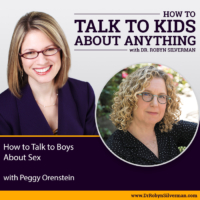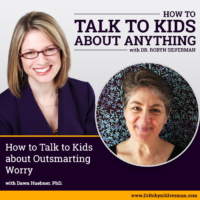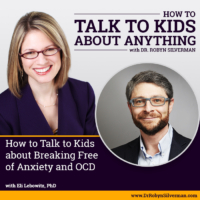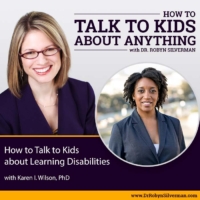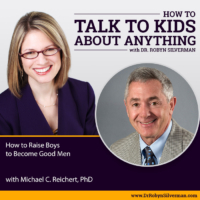Podcast: Play in new window | Download
Subscribe: Apple Podcasts | RSS | More
How to Answer Kids’ Toughest Questions about Sex
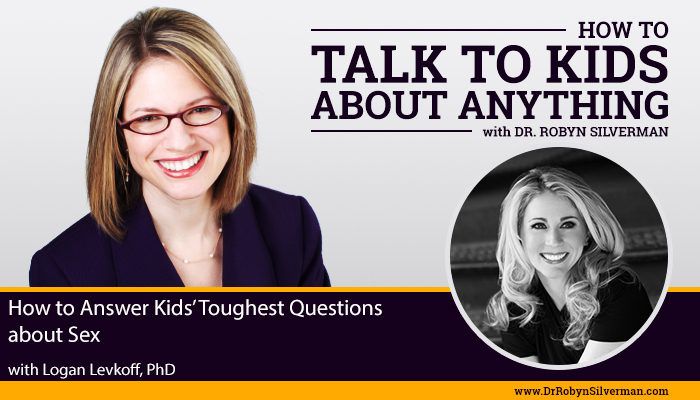
This podcast focuses on answering some of kids’ toughest questions about sex and changing bodies. From puberty to erections, masturbation and what sex is, we’re going in! Dr. Robyn Silverman interviews sexuality educator and author, Dr. Logan Levkoff on the latest episode of How to Talk to Kids about Anything.
Special Guest: Logan Levkoff, PhD
Parents, much to their surprise, have a great influence on their kids’ attitudes and values around sex, body exploration and relationships. While kids might tell you that they absolutely, positively do not want to talk to their parents (of all people) about sex or dating,  the studies reveal something completely different. Perhaps you remember when we had Richard Weissbourd of Harvard University on the show and he told us that his research continually shows that kids want to have these conversations with their parents—and not just once- they want to have lots of conversations about this information over time. They want the knowledge and they want the guidance.
the studies reveal something completely different. Perhaps you remember when we had Richard Weissbourd of Harvard University on the show and he told us that his research continually shows that kids want to have these conversations with their parents—and not just once- they want to have lots of conversations about this information over time. They want the knowledge and they want the guidance.
Now I know we’ve talked about the topic of sex before on this show—we’ve talked to Dina Alexander, Richard Weissbourd, Peggy Orenstein, Cara Natterson, and Bonnie J Rough about how to get at this difficult topic- we’ve also talked to Gail Dines about pornography and how that fits into this discussion too. But you know what? I think we are still uncomfortable about this topic. Would you agree? And as I’m currently writing the chapter of my book, How to Talk to Kids about Anything, on talking to kids about sex and synthesizing the research, all the hours of interviews we’ve done on this show about this topic, and telling you my own tips, scripts, stories and steps- I thought, let’s bring someone on who can get at some of our toughest questions. Questions that make us squeamish and yet, we still need to answer them for the health and wellbeing of our children. So are you ready? I am too. Let’s do it together.
Bio
Logan Levkoff is an internationally recognized expert on sexuality and relationships, Dr. Logan Levkoff encourages honest conversation about sexuality and the role it plays in our culture. Logan makes it clear that sex and sexuality are not “dirty” words; she works to create an environment where people feel comfortable asking (and getting answers to) their most personal questions. Logan empowers children, adolescents, and adults to embrace their sexuality and challenge the impractical, and often unhealthy, messages that they are exposed to. Logan frequently appears on television including Good Morning America, The Today Show, The Rachael Ray Show, The CBS Early Show, Oprah, Fox News Channel, and CNN. She was the host of CafeMom’s show, Mom Ed: In the Bedroom, the sexuality expert for the first three seasons of the breakout hit for A&E/FYI, Married at First Sight, and is the host of Shape Magazine’s video series, “The Sexpert.” Logan is the author of several books including Got Teens? The Doctor Moms’ Guide to Sexuality, Social Media, and Other Adolescent Realities with Dr. Jennifer Wider. She lives in New York City with her husband, son, and daughter.
Important Messages:
- Don’t just give information- impart skills! Health care, STI testing, relationship skills, negotiation skills, how to use condoms and other forms of contraception. Even
 shopping skills- shopping for tampons, deodorant, bras, condoms. Critically important skills- we tend to focus on the information and not on the actionable skills. This becomes the parent’s wheelhouse.
shopping skills- shopping for tampons, deodorant, bras, condoms. Critically important skills- we tend to focus on the information and not on the actionable skills. This becomes the parent’s wheelhouse. - Some schools provide time for sexologists to give talks about contraception and demonstrate how to use it- but some don’t. The best sex-ed programs partner with the community at large. Parents need to ask questions about what their kids are learning. Sex educators are supplementing not taking the lead on info the kids need to learn about sex.
- Go shopping! See the products that are out there. They’ve changed a great deal over the years. Innovations- condoms and sexual health products.
- 5 Things impact everyone-puberty. The majority of things that happen during puberty happen to everyone! Fosters a sense of respect and empathy- no need to go to “the boys’ side” and “the girls’ side.”
- Most of what happens in puberty to kids is the same.
- The parts that are different are for the same reason- to activate reproductive system to give choices in the future.
- All bodies have the innate capacity for pleasure. Disservice to girls when we only focus male bodies and the pleasure that comes with erections and ejaculation.
- Puberty is a complicated time where you are navigating physical changes, emotional changes and social changes but there are a lot of positives- a sense of independence, understanding ourselves before sharing ourselves with the world around us, a need for privacy.
- “You are about to embark on a transitional time that is not an overnight change. Lots of kids think it only takes about 1 year! Nope! It’s 5-7 years. There’s a lot going on- not always visible to the eye. It’s a long process. Your body and your feelings- you are going to embark on this time that takes a lot of years but you are going to change into a more mature person. You are still my child- my teen- I’m not throwing you to the wolves. It’s a journey- and it’s a journey where you’ll have a lot of questions- I’m going to be here to navigate that time, and if I don’t have an answer to your questions, I am committed to getting them for you.”
- Most of what kids need to know about puberty is the same. The few parts that are different happen for the same reason! They happen to activate the reproductive system so you have choices in the future. You don’t have to use your body in that way- but that’s what puberty is for- to give you options.
- We do a disservice to girls when we talk so much about erections and ejaculations as pleasure and only talk about reproduction for girls. The clitoris is made out of the same erectile tissue as the penis. In utero the erectile tissue becomes either the penis or the clitoris. Don’t see it in same way- but it’s still there and still for the same reason. If you have a vulva and vagina, you have erectile tissue too!
- Each parent, regardless of body parts, has an important perspective. They can model respect for others, respect for bodies, consent, relationships.
- Think about your upbringing. What were the messages you got about sex and sexuality and your body growing up? How might your life or your experience be different if the information you received about sex, sexuality and your body was different? This is the mantra you need to think about. Push yourself through the discomfort because we know what’s at stake.
- Sex: Defining sex. What is sex? We have the assumption that when someone mentions sex, we are talking about penis in vagina intercourse. That’s one type of sex. Sex is: A range of behaviors in which people share their bodies with one another.” That can be genital-genital, genital-oral, genital-anal. The idea is that sex describes something that is deeply personal and intimate during which comes the capacity for pleasure and also comes with big responsibilities.
- There’s no hierarchy that some things “count” more than others- don’t want to be hetero-normative and suggest that the only people capable of having sex are heterosexual people. For all of these ways we share our bodies are deeply personal and intimate. They should be pleasurable. And we should think of them in terms of “how do we manage outcomes?” “How do we make smart decisions?” “How do we negotiate behaviors?” When you think about it- the only thing that is different is pregnancy! Most of the potential outcomes—and let’s say outcomes instead of consequences because some of them are positive- are really the same.
- Ask your child; “what do you think sex is?” The likelihood is that they’ve been exposed to information or messages that are aligned with your values—and maybe they are not. Find out what they know and think they know. Gives them time to prep answer and also tells you what gaps you need to fill in for them.
- You can give facts and values at the same time! We don’t need to be perfect and comfortable. “I want to talk to you about this and I think you are ready to have these conversations. I want you to know that I didn’t have these conversations and some of this is new to me but I know how important it is so I’m going to push through the discomfort because I know you deserve the information.” (Then you can really say anything after that!)
- Fact, Fiction and Phraseology (Masturbation)
- Some people may have heard that kids who masturbate are possessed, have been sexually abused, are dirty, will go blind if they do it too much and lack a moral compass. Is there any facts, is this all complete fiction, and what should we say to our children about people who masturbate?
- (Complete fiction! Scientific information: There are images of fetal masturbation! Let’s not use the word “dirty” as it creates a binary of cleanliness and dirtiness, good and bad- shouldn’t be used to describe people’s sexuality.)
- Being curious about your body is basically one of the tenants of being a human being. We all have these parts- and all have the capacity for pleasure. None of us have to be dependent on another person to give us pleasure. We don’t have to seek it out from someone else- we don’t have to get it from unhealthy or unequal partnerships because we know what our bodies are capable of. There’s no magical age that you are deemed a ‘sexual being’ and someone else flips that switch in you. That is not true and doesn’t work. Regardless how comfortable you are with masturbation, it’s a very typical part of human development at all stages of life and has some great benefits. You understand what your body is capable of, you understand what the norm is for your body, what it looks like, how it feels, how you experience things.
- From a medical/health perspective, it’s important to know when things are off or unusual for your body- and we aren’t able to know that when we don’t know the norm for our bodies. We tend to forget that.
- “If there hasn’t been a time already, there may come a time when you are incredibly curious about your body, what it feels like, what it can do. Please know that it is your right, in a space that is personal and private to you, where you feel comfortable to you to explore that body. It’s completely normal if you do, and completely normal if you don’t.”
- Toddlers might put their hands down their pants at the dinner table- you can tell them to stop a million times and it make no difference!
- As we approach puberty- we are all entitled to some privacy. And it’s a good time to set some rules around knocking on doors for your child and the adult. We can set up this conversation as “you have the right to privacy, you can have the freedom to explore your body in ways that feel right to you and there’s nothing wrong with being curious about your genitals and how they work.”
- Many people have expressed that young children should not touch their bodies, explore their bodies or masturbate. It’s often thought of as too sexual for a young child to be doing something like that. Fact, fiction and how do we talk about this with our children?
- (Fiction!)
- We have parts that feel good- from head to toe. At any time during the day, you might rub your hand, and there are nerve-endings that make that touch feel good. This is not to be deliberately sexual.
- We are all sexual beings from birth to death. We express that sexuality differently throughout our lives. People typically have a hard time thinking of children as sexual beings because in our heads we conflate that with being deliberately, actively sexual.
- Masturbation as a teen or adult might be deliberately sexual- but for young children, it’s soothing, it’s exploration, it’s not the same as we see it as an adult.
- Some religions posit that masturbation is simply wrong so body exploration and masturbation should make someone feel guilty and shameful. Fact, fiction, and how should we talk about this with our kids?
- Can’t answer as fact/fiction- lots of religious, spiritual, cultural values around masturbation and sex. Not going to tell anyone they are not entitled to their own opinion and belief system.
- There’s a difference between giving young people your family’s values and lying to them. You can say; “we don’t believe in these things or we don’t support them because our religious values are XYZ,” but don’t say; “you are going to go blind, you’ll grow hair on your palms, not successful in life because they explore their bodies.” Facts are important and they’ll figure it out. If the find out that you’ve been lying to them either deliberately or inadvertently- we really use lose future conversations and that would be a shame for everyone involved.”
- Some people may have heard that kids who masturbate are possessed, have been sexually abused, are dirty, will go blind if they do it too much and lack a moral compass. Is there any facts, is this all complete fiction, and what should we say to our children about people who masturbate?
- Erections: The likelihood that boys (or those with a male body) know that their penis has the ability to get hard and will stick out. “Do you know why changes happen to the penis? During the next few years, there will be times when you can control what your penis does and it gets hard- and there will be times when you can’t control what your penis does and it gets hard. And the reason for it is that it’s made of this spongy tissue and blood rushes to it- and if you think of a sponge, a sponge will absorb water and expand, the penis will absorb the blood and expand and this causes it to get hard. It’s going to happen at a time when it’s totally convenient for you and it’s going to happen at a time when it’s totally inconvenient for you.
- Let’s think about strategies- what if you get your period at school for the first time and you’re not prepared? What if you get an erection in school and your not prepared? What can you do? Wait a few minutes. Put a notebook in front of you. Strategies in case they happen- so they can feel more comfortable. They happen!
- Teach empathy- there may be a time that it happens to someone else- don’t make them feel badly about it- it’s not their fault!”
- Focus on this idea that sexuality is a pleasurable and empowering part of our lives. It’s pleasurable emotionally and physically- and this happens when we have the tools to understand our bodies. It’s hard to feel pleasure when there is guilt, shame and lack of knowledge!
- Be positive and empowering. It’s confusing. Some isn’t great- like pimples! But there is some good here- choices of the future!
- Often asked. What if young people don’t want to talk to me? “Well, that’s too bad for them.” Guardians need to be able to say- “I know you don’t want to have this conversation with me. I get it. You know a lot. You’ve gotten this information from your friends and a whole host of sources but I really want to have these conversations with you- less for you and more for me. Because when I signed up to become a parent, I made certain promises- one of which was that I was going to help create a generation of young people who felt empowered by their sexuality. Who knew how to make good decisions—so that’s on me. I have not done my job if I am not sending you into the world with the right tools.”
- Put some of the onus on you.
- Give tools. Resources. Want us to have a conversation about some of these things. Not every adult has wonderful, consensual, equitable sexual experiences growing up and can’t have these conversations with their young people. You can use a proxy! Other adults in our lives who we adore and who we trust (and who are kids adore and trust) who can have these conversations with our young people.
- Nobody does it perfectly. We all make mistakes. The learning and growth comes from admitting that we make mistakes and have made mistakes but we are still trying!
Notable Quotables:
- “When we talk about providing information to our young people, it’s not just information and values that we impart, we have to impart skills as well.”
- “As sexuality educators we are merely supplementing what parents are doing at home all of the time. Often times, parents flip it and believe that the sexuality educators are the ones who are solely responsible but we get limited time with young people! Most of it falls on the parents.”
- “The majority of things that happen during puberty happen to everyone regardless of your assigned sex and regardless of how you identify your gender.”
- “The purpose of puberty is to activate the reproductive system to give you options in the future.”
- “When we focus on the similarities and shared experiences, we develop a great deal of respect for each other.”
- “Our words and our experiences still matter, even if they aren’t identical [to our children’s].”
- “How might your life- your experience- be different if the information you received was different? This is the mantra for parents and caregivers to always think about because that’s the motivation for doing things a bit differently if we didn’t get the best information. To push ourselves through the discomfort because what’s at stake.”
- “We are all sexual beings from birth to death. We express that sexuality differently throughout our lives. People typically have a hard time thinking of children as sexual beings because in our heads we conflate that with being deliberately, actively sexual.”
- “Facts are important…If the find out that you’ve been lying to them either deliberately or inadvertently- we really use lose future conversations and that would be a shame for everyone involved.”
How do we answer our kids’ toughest questions about sex and all that goes with it? I interview @LoganLevkoff on the #TalktoKids podcast and we go there- so that we can have truthful, productive conversations with our kids. Listen in!
Click To Tweet
Resources:
-
LoganLevkoff.com
-
Social Media: @LoganLevkoff
-
Mentioned on podcast: Amaze.org (age-appropriate videos on body or sex-related topics)
The post How to Answer Kids’ Toughest Questions about Sex with Logan Levkoff, PhD ReRelease appeared first on drrobynsilverman.com.

